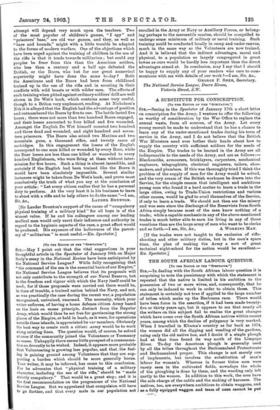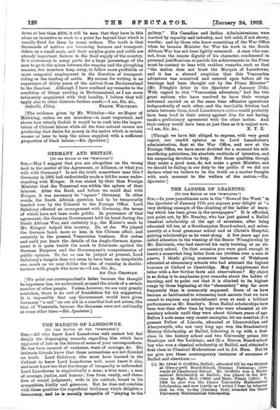THE SOUTH AFRICAN LABOUR QUESTION.
[To THE EDITOR OP THE " SPIOTAT03.1
SIR,—In dealing with the South African labour question it is surprising to note the persistency with which the statement is repeated that the native is limited in his ambition to the possession of two or more wives, and, consequently, that he can only be induced to work in order to obtain these. This statement is certainly not true if applied to the large number of tribes which make up the Bechuana race. There would have been force in the assertion, if it had been made twenty- five or thirty years ago, but it appears to me that nearly all the writers on this subject fail to realise the great changes which have come over the South African natives within recent years, among which the decline of polygamy is very marked. When I travelled in Khama's country as far back as 1874, the women did all the digging and weeding of the gardens, using only the old native hoe, and I doubt if a single plough had at that time found its way north of the Limpopo River. To-day the American plough is generally used by all the tribes throughout the Bechuanaland Protectorate and Bechuanaland proper. This change is not merely one of implements, but involves the substitution of man's labour for woman's. Whereas in former tidies men were rarely seen in the cultivated fields, nowadays the whole of the ploughing is done by them, and the weeding only left partly to the women. In addition to this work, the men have the sole charge of the cattle and the making of karosses. The natives, too, are everywhere ambitious to obtain waggons, and as a fully equipped waggon and team of oxen cannot be put
down at less than £200, it will be seen that they have in this alone an incentive to work to a point far beyond that which is usually fixed for them by many writers. The truth is that thousands of natives are becoming farmers and transport- riders on a small scale, and their surplus grain and cattle are already important factors in the food supply of the country. It is customary in many parts for a large percentage of the men to go to the mines between the reaping and the ploughing seasons, but numbers keep away, to follow more profitable or more congenial employment in the direction of transport- riding or the tending of cattle. My excuse for writing is an experience of thirty years of the natives from Bechuanaland to the Zambesi. Although I have confined my remarks to the condition of things existing in Bechuanaland, as I am more intimately acquainted with that locality, I believe they will apply also to other districts further south.—I am, Sir, &c.,
[The evidence given by Mr. Whiteley—the ex-Mayor of Mafeking, unless we are mistaken—is most important, and shows how utterly foolish it would be to rush into the impor- tation of Chinese labour while all the time natural causes are producing that desire for money in the native which is certain sooner or later to keep the mines supplied with a sufficient proportion of black labour.—ED. Spectator.]







































 Previous page
Previous page